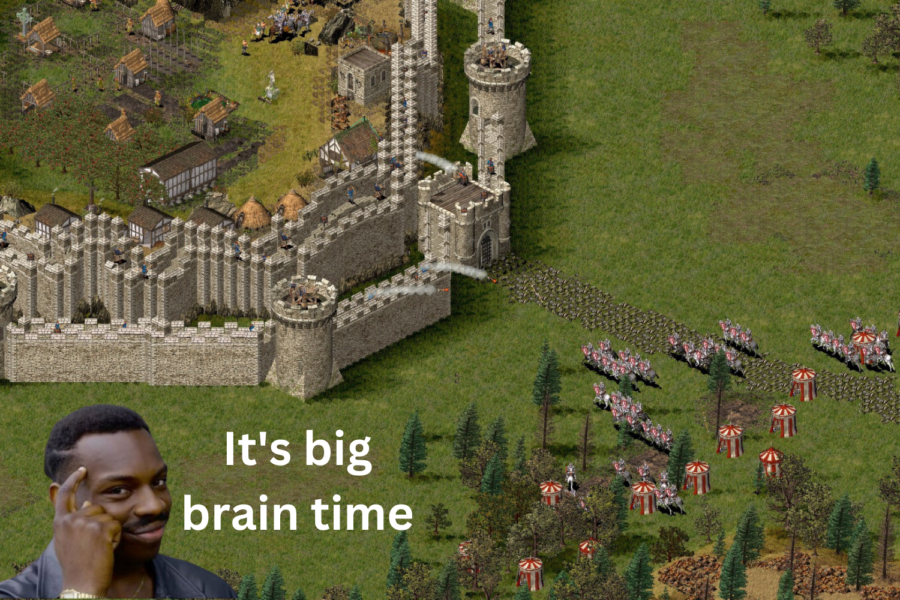Strategy games test players ‘big brain’ moves
Players often have a love/hate relationship with so-called strategy video games.
When people hear the words strategy game, they tend to think of having to use your brain and spend a lot of time playing the game. However, it doesn’t really take a lot of thinking when it comes to this list of strategy games.
Some of the biggest titles the general audience recognizes are titles like Civilization, Stellaris and Age of Empires. The gameplay tends to focus on managing armies, taking and holding territory and making strategic decisions about forms of government, and making populations of people prosperous. It can take some time to warm up to these game mechanics, which can at first feel technical and tedious. However, there is a certain sense of satisfaction in overcoming these challenges that provides a sense of accomplishment unlike any other game.
There is a wide spectrum of strategy game types that can appeal to all sorts of different players.Ultimately, what makes a video game a “strategy game” is players making difficult decisions to create a specific outcome.
They have existed since the ancient civilizations of Rome, Greece, the Levant, and India. One of the oldest and most recognizable games is Chess, which originated in India around the Sixth century CE.
There are many different types of strategy games, including abstract, team strategy, eurogames, simulators, and wargames. The following is a quick explanation of all the types.
Abstract requires that a game cannot have random elements or hidden information. Team Strategy is focused on two players whose offensive and defensive skills are constantly tested as the game’s dynamic progresses. Eurogames tend to focus more on scoring economic victories rather than military themes. The game emphasizes strategy and chance more than anything else. Simulation games attempt to simulate a real-world situation with rules that attempt to simulate real-world consequences.
Civilization is one of the most well-known strategy video game series, and is a good entry point for beginners into the genre. The first installment of Civilization was released in 1991 and has continued on to Civilization VI, which was released in 2016. It is a turn-based game in which you build cities and grow a civilization into a superpower either economically, technologically or through military supremacy. Players can take on the roles of various historical nations set from different eras in their history like the United States, India, England and Rome.
Different nations have different bonuses based on historical things that countries did. As players progress through their research and technology, they discover new resources such as iron for specific buildings, oil for their ships, and horses for their troops. Each settlement players own can have buildings that increase productivity, increase research, money generation, or empire-wide bonuses. Within their borders, players can produce worker units to improve the tiles of their territory to build farms, roads, trading posts, railroads, and mines for their strategic resources.
Civilization is a pretty simple game to learn and understand and is a good introduction to anyone interested in strategy video games.
Next on this list is the Stronghold series, which focuses on building a fortress that is defendable against enemy raids and allows players to attack others. Stronghold is a historical strategy game set in the Medieval era. The game is pretty straightforward however the game can be difficult even before you fight your enemy. Players must master their economy with their peasants before defeating their enemies.
Gathering resources for your economy requires specialized buildings that you assign your peasants to. These are divided into different categories, Castle, Defenses, and Civilian. Each of these buildings is critical to the growth of your territory. The military is mainly composed of peasants. With your military buildings, you train your peasants to become soldiers. These soldier positions range from peasant spearmen to cavalry to knights, each with its own purpose. Stronghold is a series set in the Medieval era so if you are into history you may enjoy this game. The games attract people who like the Medieval era of history and for small-scale warfare.
Company of Heroes is next on the list. The game is formatted towards smaller skirmishes instead of empire-controlling games. The first two games are set in the European theater during the Second World War.
The games are pretty simple, focusing on controlling a small amount of units on the battlefield. The game features base building to build different types of units. Each building and units requires different resources. These resources are divided into Manpower, Munitions, and Fuel. Manpower is your main resource used for buildings and all units and defenses. Munitions are used for upgrades for your units and doctrine abilities. Fuel is used for any motorized and armored vehicles and headquarters buildings.
Players can acquire these resources by capturing strategic points on the maps and dedicated resource points. This is where most of the fighting will take place. You can play as the United States Army, Soviet Union, Wehrmacht, The Oberkommando or German High Command, and the British. All of these factions play differently with their own doctrines and specialties. Overall the game is very small-scale warfare with a select few units to win the game.
The fourth and final game in this list is Stellaris, a grand strategy in which you build your empire across the known galaxy encountering new species, discovering planets, stars, ruins of empires long past, and many more. There are many premade empires that you can choose from; however, you can build your own empire based on how you want to run it. The choices made during empire creation define your experience. There are a few things in the empire creator that must be chosen carefully as they do affect gameplay. Government Ethics, Civics, Species Traits, and Origin. Your ethics are the way your government runs, such as an Egalitarian Society in which liberty and freedom are valued above all else. You can also be Authoritarian with a few powerful people in complete control of the state and its people. Do you wish to be a militaristic state with martial prowess being a driving force in your government, or do you want to be a pacifist state where you denounce violence in favor of building up your empire and its people. These are just a few things you can choose and these decisions will affect gameplay and how other empires interact with you. Civics are straightforward, you choose them based on your government type and ethics, each with their own unique benefits. You can always change these later if you don’t need them or want something different midway through your playthrough.
Stellaris is a galaxy wide empire building game with careful management of your empire and its position in the galaxy. It has a very steep learning curve and it will be a while before you understand everything. It is also very time consuming so make sure you don’t have plans before playing.
These are just a few games you could try if you’re new to strategy games and don’t know what to play. They each have different audiences depending on what you like, so if you don’t like one try another. Each game has their own learning curve and difficulty so if you’re struggling for a while it’s all part of the process. I hope this list inspires you to play a strategy game.
Your donation will support the student journalists of Akins High School. Your contribution will allow us to purchase equipment and cover our annual website hosting costs.

Academy: New Tech
Number of Years on Staff: 4
Title: Staff Writer
Why do you enjoy being on staff? I like to write about games or shows that I’m really hyped or passionate about
What do you do for fun? Play on my Xbox
What are your hobbies? I play video games
Hopes & Dreams after high school? Possibly military or police









